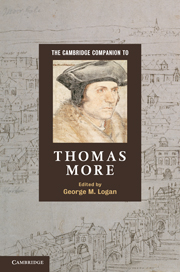Book contents
3 - More’s rhetoric
from Part I - Life, times and work
Published online by Cambridge University Press: 28 May 2011
Summary
Thomas More, ‘the man for all seasons’, could also be characterized as ‘rhetorical man’. As Peter Ackroyd observes, rhetoric was ‘the basis of all his work. His wit, his ingenuity as a writer, his skill as an actor, and his public roles, were all part of the same dispensation’. A single essay cannot cover all these aspects of the man or his writing. More wrote voluminously, and even the Yale edition of his Complete Works – in fifteen volumes, two languages and multiple kinds – needs to be supplemented with editions of his personal letters and with his professional writings as lawyer, judge, king’s secretary, orator, diplomat and lord chancellor, in so far as they are extant. Furthermore, for More and his fellow humanists rhetoric was essential and indispensable to writing, regardless of type. Obviously formative in what we call literature (which they thought of more broadly as bonae litterae – ‘good writing’), it was equally important in polemics; and devotional writing, too, had its rhetoric, even if it was little interested in aesthetics.
More excelled in each of the rhetorical kinds he used. Among readers in general, Utopia and his History of King Richard the Third have proven pre-eminent; but many have found solace and strength in his Dialogue of Comfort against Tribulation, his De Tristitia Christi and his prayers; and his polemical works, especially the Dialogue Concerning Heresies, have strong defenders. Many of More’s ‘literary’ works belong to his humanist period, which lasted through the second decade of the sixteenth century or a few years later. These include almost all his English poems, most of his Latin epigrams, Utopia, several long Latin letter-essays and the Latin and English versions of the History.
- Type
- Chapter
- Information
- The Cambridge Companion to Thomas More , pp. 46 - 68Publisher: Cambridge University PressPrint publication year: 2011
- 3
- Cited by



